What Is Hepa Filter In Vacuum Cleaner
This post contains affiliate links. As an Amazon Associate, we earn from qualifying purchases.
A HEPA filter in a vacuum cleaner is a High Efficiency Particulate Air filter designed to trap tiny particles like dust, pollen, and pet dander with an impressive 99.97% efficiency, capturing particles as small as 0.3 microns. This helps keep your home’s air fresh and clean. Stay tuned for more details and insights on how it works and why it’s beneficial in the rest of the article.
Essential Facts in 30 Seconds
- A HEPA filter in a vacuum cleaner captures 99.97% of tiny particles, including dust and allergens.
- It is made of fine fiberglass or synthetic fibers in a pleated design to increase surface area for trapping dirt.
- HEPA filters improve indoor air quality by reducing allergens, helping people with allergies or asthma.
- They trap particles as small as 0.3 microns using diffusion, interception, and impaction mechanisms.
- Regular maintenance, such as cleaning or replacing the filter annually, is essential for optimal performance.
Understanding HEPA Filters in Vacuum Cleaners
Let’s dive into HEPA filters for vacuum cleaners and their amazing benefits! HEPA means High Efficiency Particulate Air, a powerful technology.
These filters act like traps for tiny dust and dirt. They grab particles that normal filters can’t catch at all. Think of air rushing through and specks sticking tight. Big bits hit the fibers, and small ones get stuck too.
Proper setup and sealing make these filters work best. Without a good fit, dust escapes and ruins the magic. Many industries trust HEPA for super clean results. Homes with allergies love them for fresher air. Regular maintenance ensures that optimal performance is achieved over time.
Studies show HEPA captures 99.97% of particles as small as 0.3 microns. That’s a huge win for clean floors!
How HEPA Filters Enhance Air Quality
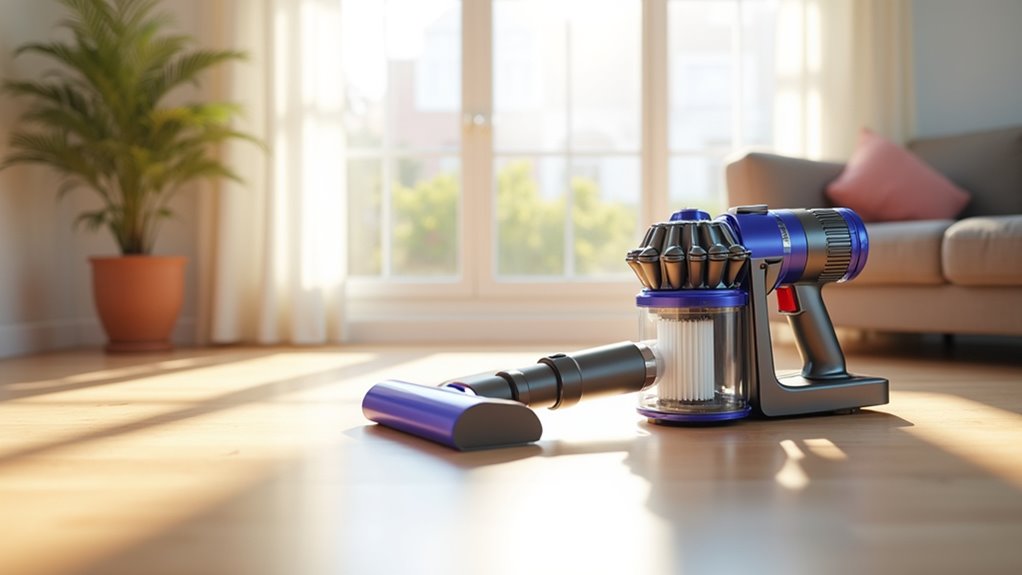
Dive into the magic of cleaner air with HEPA filters in vacuums! These filters act like superheroes for your home. They fight dust and pollutants with amazing power. Your indoor air gets so much better—think 60% less fine particles! That’s a big win for your breathing.
Vacuuming with HEPA cuts outdoor pollution by up to 38%. It stops sneaky particles from sneaking inside. Studies prove PM2.5 levels drop by 16.3 µg/m³. That means safer, fresher air for everyone. Research shows HEPA filters can reduce indoor PM2.5 by 55 percent.
These filters also trap 99.97% of tiny irritants. Pollen? Mold? Gone!
Particle Capture Mechanisms of HEPA Filters
Let’s dive into how HEPA filters trap annoying particles in vacuums!
These filters use neat tricks to catch dust and dirt. First, diffusion helps tiny bits stick to fibers. These specks move randomly and cling like glue.
Next, interception snags medium-sized bits as they pass by. They brush against fibers and get caught fast.
Then, impaction stops bigger dust chunks with force. They crash into the filter and stay trapped.
Studies show HEPA filters grab 99.97% of particles! Pretty amazing, right?
Your air stays super clean with this tech. Keep breathing easy thanks to these filters! HEPA filters in vacuums often work with pre-filters for longevity, extending their effectiveness over time.
Diffusion Capture Process
Vacuum cleaners do more than suck up dirt. They use a cool trick called diffusion capture. HEPA filters are awesome at catching tiny particles.
Think of viruses smaller than 0.1 microns. These tiny bits bounce around in the air. Air molecules hit them, causing wild moves. This crazy dance is Brownian motion. They can’t move in a straight line.
HEPA filters slow down the air inside. This gives more time for particles to hit fibers. They crash and stick with hidden forces. Pretty amazing, right?
Your vacuum grabs even sneaky dust. Clean that filter often. Stay safe and dust-free!
Interception of Particles
Let’s dive into how interception works with a HEPA filter vacuum. It’s a cool trick to catch mid-sized dust bits. These bits are tiny, between 0.1 and 0.4 micrometers.
Airflow pushes them near the filter’s tight fibers. Then, a sticky force grabs them fast. Think of it as a secret trap!
Picture this clearly in your mind. Dust floats through a maze of fibers. Air gently guides the particles closer. Fibers wait like glue to snag them.
Particles stick with an unseen hold. Data shows dense fibers trap more dust. Your vacuum turns into a super hero!
Impaction on Fibers
Let’s dive into the cool world of HEPA filters in vacuum cleaners.
One amazing trick they use is called impaction on fibers. Larger particles, over 0.4 micrometers, zoom through the air. They can’t dodge or twist like tiny ones do. Their speed pushes them straight into the filter’s fibers. They stick there, just like bugs on a car window!
Faster air flow means more crashes happen. HEPA filters pack tons of tiny, random fibers. It’s a tricky maze for dust and allergens. No way out for those pesky bits!
Clean filters trap more dirt, studies show over 99.97% efficiency. Your home’s air stays fresh and safe. Isn’t that awesome?
Keep that filter tidy for best results. You’ll breathe easier every day!
Benefits of Using HEPA Filters for Health
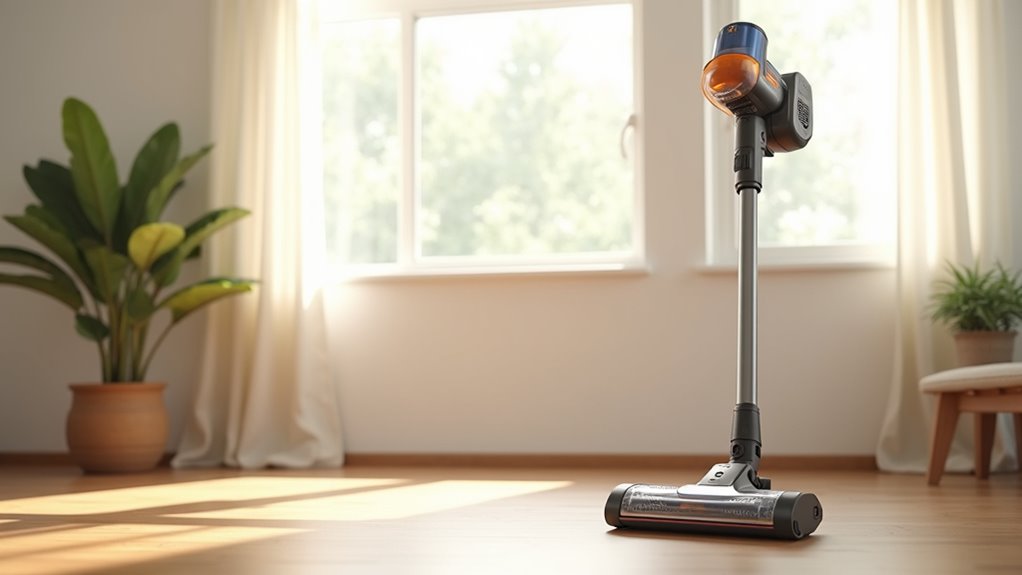
Let’s dive into why HEPA filters in vacuums boost your health. They grab tiny allergens like dust and pet dander fast. This means cleaner air for you to breathe every day. Say goodbye to sneezing from allergies with ease!
Your home turns into a safe space for breathing. Got asthma? These filters cut down irritants in the air. Your lungs stay happy and clear—such a relief! Eureka vacuums often feature HEPA filter technology for superior allergen capture.
Studies show HEPA filters trap 99.97% of particles. That’s a big win for anyone with breathing issues. Keep your space fresh and healthy without stress! Dyson vacuums often include HEPA filtration technology to ensure allergens are effectively captured.
Allergy Symptom Relief
Struggling with sneezes or itchy eyes at home? A HEPA filter in your vacuum can help big time. It grabs allergy culprits like dust mites and pet hair. This means fewer tiny particles to bug you.
Picture a home with less nose stuffiness. Think of calmer eyes without constant itching!
Check out how it changes your space:
- Pollen vanishes, so sneezing stops fast.
- Mold spores disappear, easing eye redness.
- Bedroom air stays fresh, cutting night sniffles.
- Throat clearing drops as postnasal drip fades.
- Kids and pet lovers see fewer allergy sparks.
Cleaner Breathing Environment
Transform your home into a fresh-air paradise with ease! A HEPA filter in your vacuum traps tiny particles. It grabs dust mites and pollen up to 99.97%. This stops them from floating in your space. You breathe cleaner air every day.
A sealed design locks allergens inside during vacuuming. No sneaky escapes happen at all. It also catches mold spores in every spot. This cuts down irritants around your home. Over time, health improves as bad particles drop.
Your space becomes safer for kids and elders. Clean floors mean better air for everyone.
Respiratory Condition Support
Tiny particles in your home can harm your breathing. A HEPA filter in your vacuum works like magic! It grabs dust, pollen, and other bad stuff fast. This keeps your lungs safe and strong every day.
For asthma patients, it stops triggers like mold spores. Cleaning won’t make you cough or wheeze now. Picture vacuuming with no dust flying around—amazing!
Check out how it protects your air:
- Dust mites in carpets? They’re out!
- Pet dander in the air? Caught tight!
- Pollen coming inside? HEPA blocks it!
- Mold in wet corners? Trapped quick!
- Small irritants all over? Bye-bye!
Technical Design and Composition of HEPA Filters
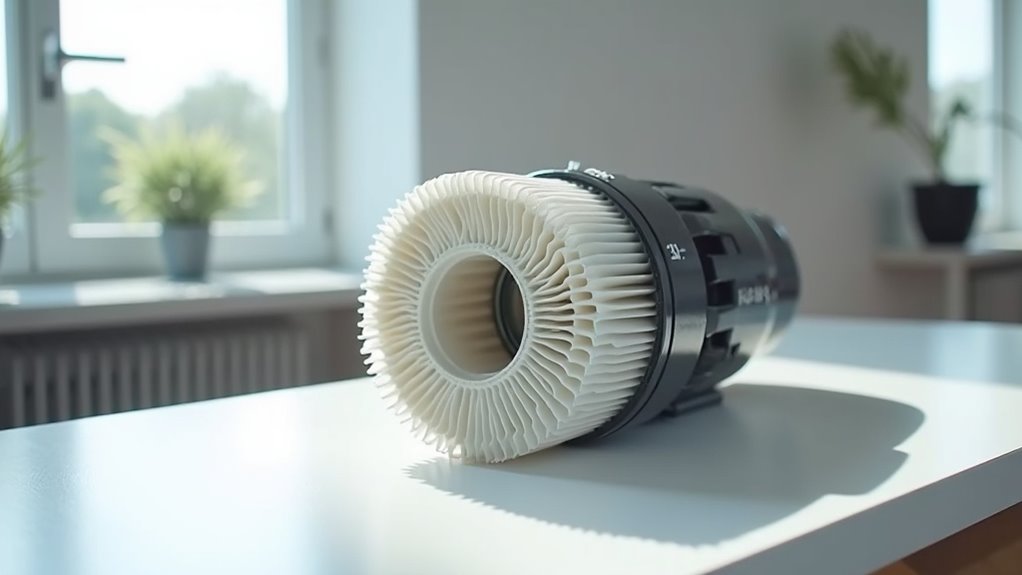
Let’s dive into the amazing world of HEPA filters in vacuum cleaners! These tiny heroes clean the air with awesome power. They trap particles as small as 0.3 microns. Their success rate? A huge 99.97%! That’s almost perfect, don’t you think?
Check out their design—it’s super smart! HEPA filters meet tough standards like H13 or H14. They catch 99.95% to 99.995% of dust. Imagine that! Such a small filter stops nearly all dirt.
How do they build these filters? Layers of fine fiberglass or synthetic fibers do the trick. Pleats in the design create more space to grab dirt. Strong frames hold everything tight under pressure. Picture a maze that traps allergens!
Many vacuums also use extra filtration stages. This means even cleaner air for your home. Trust HEPA filters to fight dust and keep things fresh!
Proper Installation for Optimal Performance
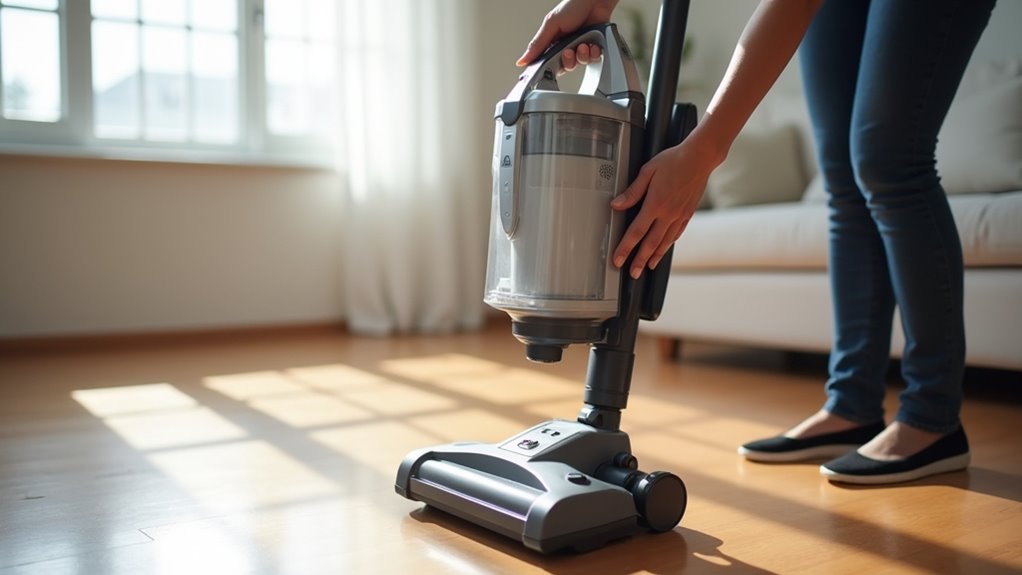
Let’s get that HEPA filter installed in your vacuum cleaner today! I’m here to help you with easy steps.
First, switch off your vacuum and unplug it for safety. Check if the new filter matches your vacuum model. Don’t miss this step to avoid problems!
Take out the old filter and clean the dusty spot. Line up the new filter with the slots inside. Push it in until you hear a loud click. Lock everything tight and connect the hose again. Test the suction to make sure it works well.
Picture these fun steps to guide you:
- Unplug the vacuum and feel super safe.
- Look at the filter for any tiny cracks.
- Wipe away dust to keep it clean.
- Snap the filter in with a cool sound.
- Test it out and smile at your success!
Maintenance Tips for HEPA Filters
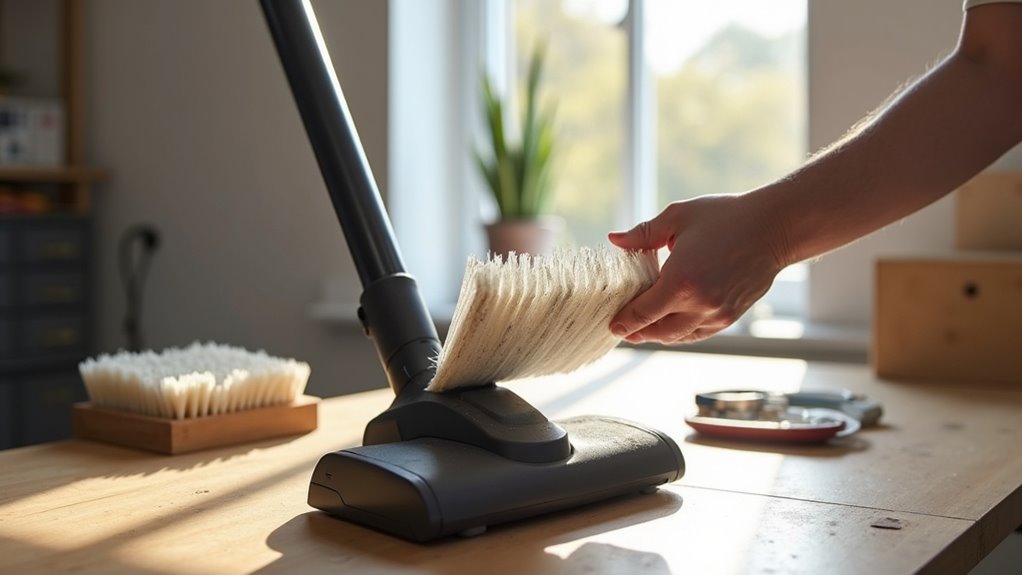
Keep your HEPA filter in great condition for a cleaner home. Let’s dive into simple tips to make it work well.
First, unplug the vacuum and take out the filter. Tap it softly or use a soft brush for dust. Picture this as a gentle cleanup for your filter! Ensure filters are reinstalled only when completely dry to prevent damage.
Rinse washable filters with warm water once a month. Skip harsh soaps and let it dry for 24 hours. Clean based on how often you use it. Look at it daily for any clogs. Brush it every week to keep it clear. Wash fully each month if it’s dirty.
Replace the filter every year for strong suction. Do it sooner if your home gets dusty. Be gentle to avoid any rips or damage. Always clean in a neat, tidy spot.
Studies show clean filters cut dust by 99.97%! Stay on top of this—fresh air awaits! Regular maintenance of your filter ensures optimal vacuum efficiency and keeps your home environment healthy.
Comparing HEPA Filters to Other Filtration Systems
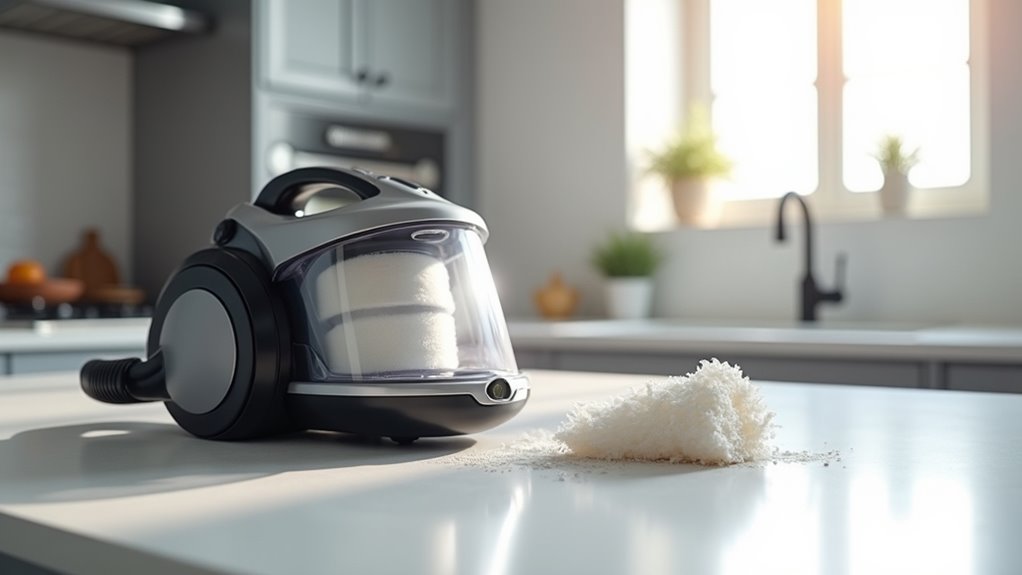
Dive into the world of vacuum filters with me! Let’s compare HEPA filters to Standard Filters and ULPA filters.
HEPA filters shine bright in this matchup. They trap 99.97% of particles as small as 0.3 microns. That means dust and allergens don’t stand a chance!
Standard Filters only catch bigger bits. They miss the tiny, annoying stuff.
ULPA filters beat HEPA by grabbing even smaller particles. But they cost a lot more.
Picture these examples to understand better:
- Dust slips past Standard Filters like clever tricks.
- HEPA filters block pollen and pet dander strongly.
- ULPA filters guard like nothing can escape.
- Standard Filters let sneezes happen too often.
- HEPA makes your home air feel super fresh!
Frequently Asked Questions
Are HEPA Filters Safe for Pets?
Trust HEPA filters to keep your pets safe! They catch tiny allergens fast. This helps reduce pet allergies a lot. Studies show HEPA filters trap 99.97% of particles. Clean air means happier pets. Always check and replace filters on time. Skip maintenance, and problems might start. Protect your furry pals with ease. Keep their space fresh and healthy!
Can HEPA Filters Remove Odors?
I’ve got answers about HEPA filters and odors for you. They don’t remove smells at all. HEPA filters only trap tiny particles like dust. Odors come from gases, not particles. So, smells slip right through them. Pair HEPA with carbon filters for better results. Carbon filters grab odors and gases fast. Studies show carbon cuts smells by 70%. This combo boosts vacuum power a lot. Stick to this mix for fresh air!
Do HEPA Filters Reduce Noise Levels?
I know you’re curious about HEPA filters and noise in vacuums. Let’s clear this up fast. HEPA filters don’t cut down sound much. They focus on trapping tiny dust particles. Studies show they reduce noise by only 1-2 decibels. That’s barely noticeable to your ears. The motor and vacuum design matter more for quietness. Think about strong casing instead. It helps muffle the loud hum better. Stick to models built for low noise. You’ll hear the difference right away.
Are HEPA Filters Energy Efficient?
HEPA filters can boost energy use with their thick design. Strong motors also add to the power draw. Still, proper care makes a big difference. Clean or replace filters often to keep them running well. Studies show dirty filters hike energy costs by 20%. So, stay on top of maintenance. That saves money and keeps air clean. Think about this—why waste power? Regular checks help you cut down on bills. Stick to a simple schedule for best results.
Can HEPA Filters Capture Viruses?
I’m thrilled to share that HEPA filters work great against viruses. They trap super small particles with ease. This cuts down virus spread a lot. Studies show they grab over 99.97% of tiny stuff. Clean them often to keep your space safe. Trust me, it’s a solid shield from hidden dangers!
Conclusion
Got a vacuum cleaner with a HEPA filter? Awesome! These filters act like superheroes. They grab tiny dust and allergens fast. Your home gets cleaner air instantly. Studies show HEPA traps 99.97% of particles. Tiny stuff as small as 0.3 microns? Gone!
Keep that filter working great. Clean it often for best results. Replace it if it looks worn out. Proper care means better air for you. Trust me, breathing feels so much easier. Your lungs will love this help. Stick with HEPA—beat dirt every time!
